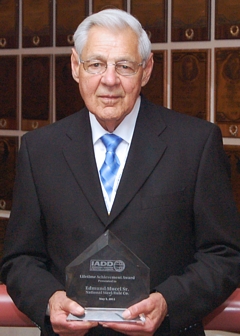Edmund Mucci Sr.
2011 Lifetime Achievement Award Recipient
 New Game, New RULES
New Game, New RULES
Mucci Sr. Receives 2011 IADD Lifetime Achievement Award
Literally and figuratively, 2011 IADD Lifetime Achievement Award recipient Edmund Mucci Sr., President of National Steel Rule Co., personifies this year’s Odyssey theme, “New Game, New Rules.”
Recognized during the IADD/FSEA Awards Dinner for his remarkable achievements and continuing service to our industry, Ed is a true pioneer in the corrugated industry. Together with his partner, Joe Bialoglow, he has created over 500 unique steel rules, adding two more in just the past few months. These products have revolutionized rotary diemaking and diecutting, and Ed has traveled around the world presenting excellent training and seminar programs to the corrugated industry. His tireless commitment and selfless support of the IADD—he served as the fifth president—have advanced both our industry and the association that serves it.
Ed entered the industry right after high school, as a press operator, at a Mead Container Box plant in Jersey City, NJ, USA. Shortly after starting, he was drafted and spent two years in the Army. When his Army service was complete, he returned to the plant as a press operator until the company moved to Massachusetts. During that time, he had also started making dies. This led to his next job which was at Hudson Steel Rule Dies in Jersey City.
It was at Hudson that the two major events that influenced his career converged: the introduction of the first Ward rotary diecutter and meeting Joe Bialoglow, who became his business partner. Ed was running the die shop and Joe was in charge of printing plates, but they saw an opportunity in the new rotary diecutting technology. The rotary rule that was available at that time was almost impossible to bend, which led them to form a company using what was a then unheard of method of producing serrated rule. Starting with seed money of only $500, at first it was a business they worked at after they finished their full-time jobs at Hudson. Their first attempts at manufacturing involved methods that sometimes produced only one serrated tooth at a time. Many of those same tooth patterns Ed created back then are still viewed as industry standards today.
Eventually they chose to leave Hudson and purchased a small machine shop in Roselle, NJ, USA, to open up a die shop specializing in corrugated and specialty dies. They also moved the fledgling rule company to their first factory in Roselle.
As Ed explains it, “Any time you are entering a business based on what was then brand new technology, you are forced to learn as you go. There was a tremendous amount of trial and error getting rotary dies to run acceptable products. It was the same thing with the development of rotary rule. Through the years we have experimented with hundreds of tooth profiles and products which led to the products that are used throughout the industry today. Even after almost 45 years in business, we still face challenges. We are now a mature industry, which tends to mean our products have been commoditized. Unfortunately, this not only true of steel rule, but of cutting dies as well. The biggest challenge today is to stay on the leading edge of technology and to remain a leader in the industry from a company standpoint.”
Ed greatly values the people working with him at National, citing their belief in the products and company philosophies. Whether they’ve been with the company from the start, or have been newly hired, he welcomes the balancing of experience and fresh perspectives that is needed to succeed in what is a very competitive and demanding industry. He states that the trait that separates great companies from good companies is a constant desire to improve—feeling that no matter how successful you may be at any given point, you can never be satisfied.
“Our philosophy is to serve customers above all else. We are a service company disguised as a steel rule company. Having been diemakers, I think we have a unique perspective among our competitors in terms of the pressures diemakers face. Most of the products we have developed have been designed to solve problems brought to us from diemakers. It is easy, but dangerous to focus too much attention on your own business and not enough on your customers’ businesses.”
A very small sampling of those products he created includes: Klean Kut, Euro-Cut, 10T Serrated, Laser Crease, Self Leveling Rule, and Kushion Crease. While all of these items have been around for quite some time, they are still so well-known and well-respected today that most have become virtually “household names” and industry standards.
Ed says it is hard to fathom the changes that have taken place since he and Joe began their business. With regard to the company, he says, “When we were small, all decisions came from the top. As we grew through traditional organic growth, as well as through acquisition, we have formed a management team that I feel is among the strongest in the industry. Decisions are now made throughout the organization, with strategy and direction coming from our management team.”
An extremely modest man, it’s difficult to get Ed to talk about himself. When pressed, he suggests that his greatest accomplishment has been “to build a company that is successful and hopefully has staying power. This is not something that any one person can accomplish by themselves. I have had two partnerships in my life that have both exceeded 50 years. Despite the fact that Joe and I are very different people, our business partnership works as well today as it did when we were operating in a garage. I think my other great accomplishment has been to remain married to my wife Kathy for 57 years.”
Joe says that Ed simply doesn’t give up. Whether tacking a really tough problem or trying to figure out why a particular employee is not doing well in a certain position, Ed will eventually find a way to solve the problem, usually in a way that leads to everyone’s continued success. Ed brings that kind of positive, can-do attitude to everything he does.
He was influenced by numerous people throughout his career, but he specifically mentions Ray Miller, John Gordon, and Phil Saunders. “Ray was a visionary who was extremely open despite having technology no one else had. John built the type of dieshop i would have wanted had I stayed in the die business. Phil was a competitor at first and went on to become a customer and good friend. These men are icons in our industry.”
In his youth, Ed was a superb athlete and received all-county and all-state honors in baseball and football. He was fortunate never to have been on a team that had a losing season. He also had a scholarship offer as a wide receiver from football powerhouse Penn State, and he even tried out as a professional pitcher for the Philadelphia Phillies. He found out early how to compete at a high level and how to win.
Son Wayne is a physician, and Eddie Jr. is General Manager of National, winning industry awards in his own right. Now one grandson has shown some interest in working at National. Ed hopes anyone thinking of joining the industry will first get a sound technical background in both product application and business. He says, “Companies will become more and more reliant on technology as a means of differentiating themselves. Future leaders are going to be those who understand the technology and can apply it effectively to better serve customers.”
Ed continues to put in a very full work week, even with having to commute about 2-1/2 hours a day. He usually begins his morning by saying a personal hello and sharing pleasantries with many of his employees. He enjoys an occasional round of golf, but his true passion is very obviously for his work and his people.
He also encourages getting involved in the IADD: “I believe in sharing knowledge, and that’s what the association has always been about. When we were a young company, IADD gave us a venue to interact with customers as well as to both teach and learn. More than anything else, it introduced me to creative and influential people I would never have otherwise met. I have always recognized the value of participation in IADD, and to this day encourage and support our company’s involvement.”

